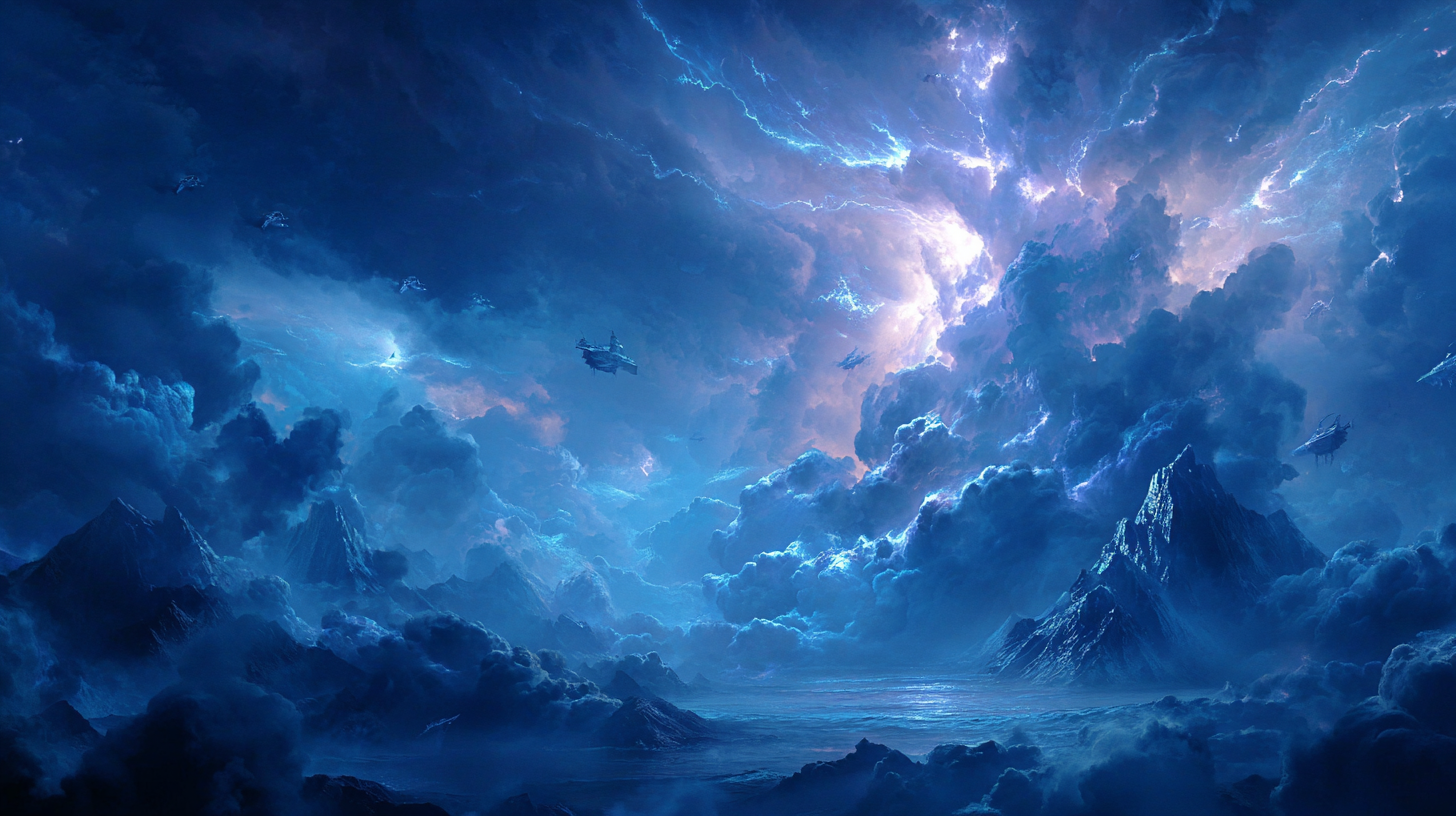
The Caedryn Federation
The Caedryn Federation is a nation of storm-wrought ambition, its cities built on towering cliffs and high aeries where the sea-winds lash and the thunder answers their banners. From these heights their fleets of skyships rise like stormclouds, sails woven with Aetheric thread and hulls etched with runes that defy the weight of stone and steel. To the Caedryni, the sky is more than space above—it is their birthright, their shield, and their battlefield. The people of Caedryn are sailors, engineers, and storm-callers, a culture shaped by the ceaseless rhythm of wind and tempest. Their children learn the constellations before they learn their letters, for the stars guide both their trade and their wars. Lightning dances across their festivals as both spectacle and sacrament, for they believe the Aether’s storm is a covenant between their bloodlines and the heavens themselves. Unlike Seravelle’s shadowed subtlety or Virelion’s radiant fire, the Caedryni wield the Aether as harnessed storm: wind given form, thunder carried in chains, bolts of wrath loosed from the hands of their storm-mages.
Politically, Caedryn is ruled by the Sky Admiralty, a council of admirals and stormlords who command both the fleets and the weather-wrights. While noble lineages hold sway, true authority belongs to those who can master both skycraft and strategy. This has forged a meritocracy tempered by discipline; those who rise are those who prove themselves in the fleet, for every Admiral must first serve as sailor, captain, and stormbound officer. Beneath their banners,loyalty is to the fleet first, the federation second, and self last.
The military of Caedryn is the most mobile and far-reaching in Vaelthar, built around their skyfleets that strike as sudden squalls upon the unprepared. Their tactics favor maneuver and misdirection, hemming in foes with wind-sorcery while their airships rain fire from above. Units on the ground advance with precision, guided by aerial signals and stormcallers who manipulate the very weather to veil movements or scatter enemy ranks.
To fight Caedryn is to fight the storm itself—never still, never predictable, always pressing from angles unseen.
Yet, amidst their thunderous might, the Caedryni remain a people of pride and craft. Their artisans fashion stormglass that hums with captured winds, their scholars chart the mysteries of lightning, and their poets sing ballads of sky-duels and cloudborn journeys. To them, life itself is a voyage: perilous, boundless, and forever reaching for higher skies. In this pursuit, the Commonwealth of Caedryn stands unbroken, for as their Admirals often declare: the storm does not bow—it reigns.
“The sky is not our limit. It is our dominion.”
—Admiral Thalos Caedryn, Skyfleet Proclamation
The Prelude of Storm
Hour 03 — The peaks are singing again.
We anchored at Aerys Spire before dawn, sails reefed tight, rigging drawn so taut the lines hum when touched. In the chartroom, the stormglass twists into a helix—two currents braided together, then breaking apart. The engineers insist the barometer is wrong; it isn’t falling, it’s climbing into a measure we don’t yet understand. I told them to trust their eyes: the banners stand straight out, though the air is still.
Below us, the Federation wakes. Skyblades drill along the landing grates, their lances sparking like chained candles in the mist. Children on the terraces lift copper rods toward the clouds, laughing as threads of blue leap to their fingers and vanish. A city built for air and prayer. We were ground-born once. I can’t imagine it now. The sky is our home—and our law.
Hour 06 — The shard burns beneath the mountain.
I’ve seen it only once, during the Vows of Command. It isn’t within the peak—it is the peak, veins of frozen lightning webbed through stone. When the High Admiralty bows, the shard answers with a low resonance that trembles in bone and blood alike. The old sailors say thunder is the Aether’s speech. If that’s true, the shard doesn’t speak to ears—it speaks to marrow.
Hour 09 — Stormfront sighted.
Not approaching—unfastening itself from the horizon. The cloud wall is clean as a blade’s edge, no ragged fringe, no heralding wind. Our Windpiercers climb the masts, scopes flashing like eyes. The first thunder rolls above us, deep and measured, and the Zephyrion answers—her ribs groaning, her skin flexing. Skyships live again when the storm remembers them.
Hour 10 — We lift.
There’s a purity in that moment when the moorings slip, when the deck tilts and the world below falls away. Men who shout on the ground go quiet in the clouds. Men who lie find their tongues made honest by height. Maybe it’s the cold—or the truth that falling feels closer than dying. I call the roster by voice; every name returns, clear and steady.
The Admiralty signals: Form weatherline.
The great ships step off in staggered ranks, teeth against the storm. Gunships rake the cloudflanks, seeding countercharge, their engines humming to disguise fear as melody. We do not fight the storm. We negotiate it.
That is Caedryn’s creed—mastery without arrogance. The sky remembers every man who dares to call it his.
Hour 12 — Lightning duels.
The first bolts strike wild, searching. The next choose. There’s mind in it—forks that pause, retreat, then reach again with a different intent. Our stormcallers reply in kind, weaving cages of light to catch and release each strike. Pirates call it sorcery. We call it courtesy. You meet a force with form; you bow; you do not break. The Zephyrion shudders. The helmsman kisses the wheel. I taste iron on my tongue—not blood, but storm. The crew laughs at nothing. We always do when terror bends into awe.
Hour 13 — Contact.
A flotilla to the east vanishes—not torn apart, simply erased. A clean gap in the cloud, sealing shut like an eye. Then a black line appears across the horizon—perfect, deliberate. “That isn’t weather,” my first mate says. He’s right. It’s an answer.
The Admiralty orders a wide tack. We obey, but the line moves with us, translating our motion into its own syntax. The storm is learning.
Hour 14 — Losses.
We lose the Starmarrow. Not to flame—to silence. She drifts from formation, sails full, lanterns dark, no distress flare. She passes beneath us so close I could’ve thrown a rope. Her crew stares upward, rapt, listening to something none of us can hear.
The shard brightens in the mountain. The stormglass in my pocket splits with a crack that sounds like laughter.
Hour 15 — The storm speaks.
No words. Just a pressure in the mind, the memory of prayer without the meaning. Men drop to their knees because their bodies remember worship even when their hearts do not. I go to the bow, bareheaded, windless. “We are Caedryn,” I whisper, too low for the crew to hear. “We learn. We do not kneel.”
The pressure eases. The ship steadies—like a creature that has chosen to spare the hand that reached for it.
Hour 16 — Countermarch.
We dive through the storm’s throat, trimming the sails to bone, slipping through sweet-air pockets between the roars. Gun decks fire rhythmically, not to destroy but to redirect—to persuade the storm toward safer paths. Below, lightning fills the mountains like molten silver. For a heartbeat, I see the shard’s entire web glow at once—the world’s skeleton, lit from within. It is too beautiful to look at for long.
Hour 18 — Damage.
A single bolt takes our foremast—no fury, no flourish, just purpose. Two men go with it mid-song. The silence left behind feels endless. I write their names in my log. I’ll write their letters home myself. Caedryn letters don’t apologize. They record. Sorrow lives in the spaces between the lines, where loved ones can read it without seeing the word.
Hour 19 — The storm learns mercy.
Or perhaps only weariness. The pressure lifts. The sky softens into sapphire. Rain falls like cool light, not water. Below, the terraces shimmer, and children lift their hands to taste it. The shard dims. The mountain sleeps. We count our dead. They call us arrogant for claiming the skies. They’re wrong. Every ascent is an apology. Every descent, a confession. The storm is not ours to rule—it’s ours to respect. If we are proud of anything, it’s this: that we went out together, and returned together, as far as the storm would allow When they read my name in the ledgers, let it say only this:
He held the wheel and did not teach the sky a lesson. He learned one.
The heavens answer every hand that dares them—with the grammar that hand deserves.
Today, we spoke in tacks and bowlines, in grace and restraint. And the storm answered in kind.
We reached for the heavens—
and found they were already reaching back.

